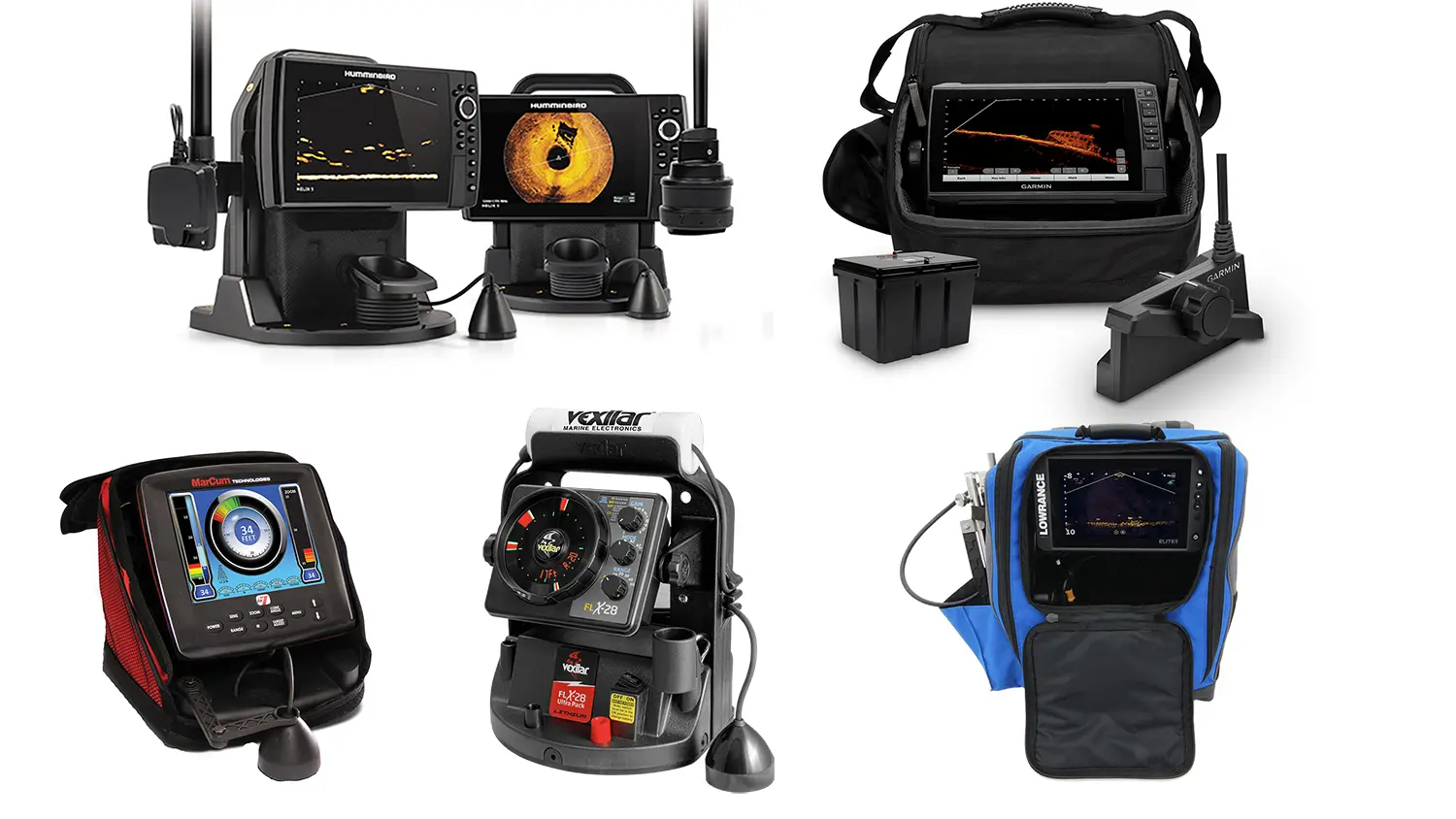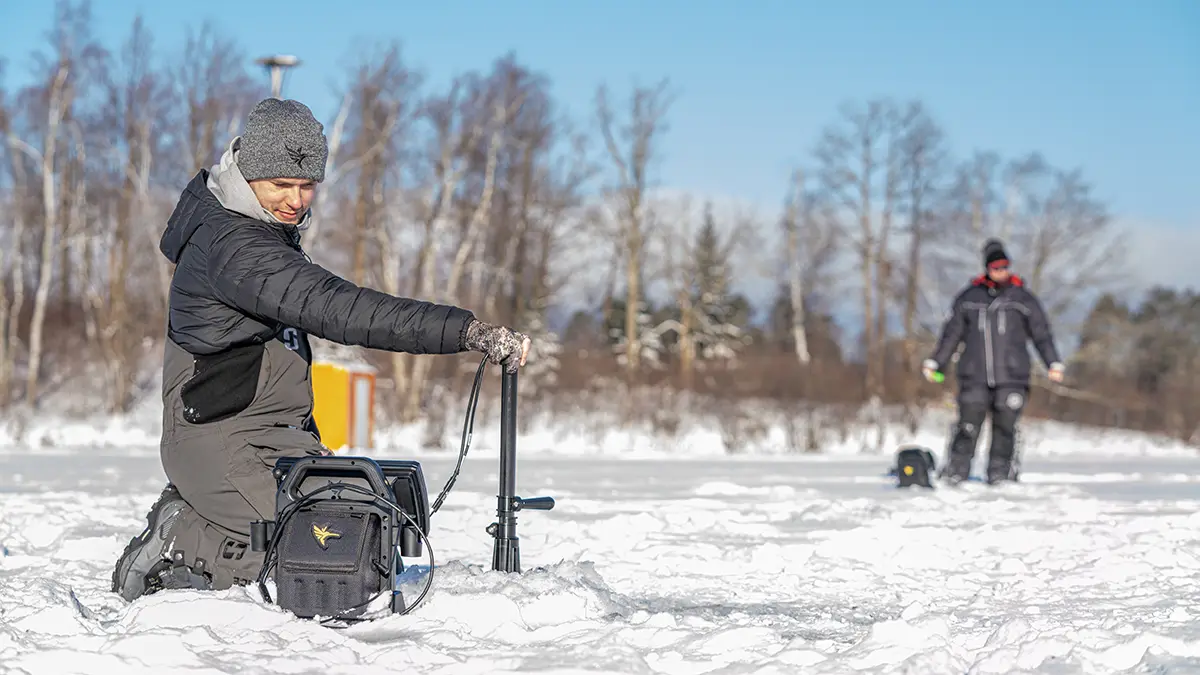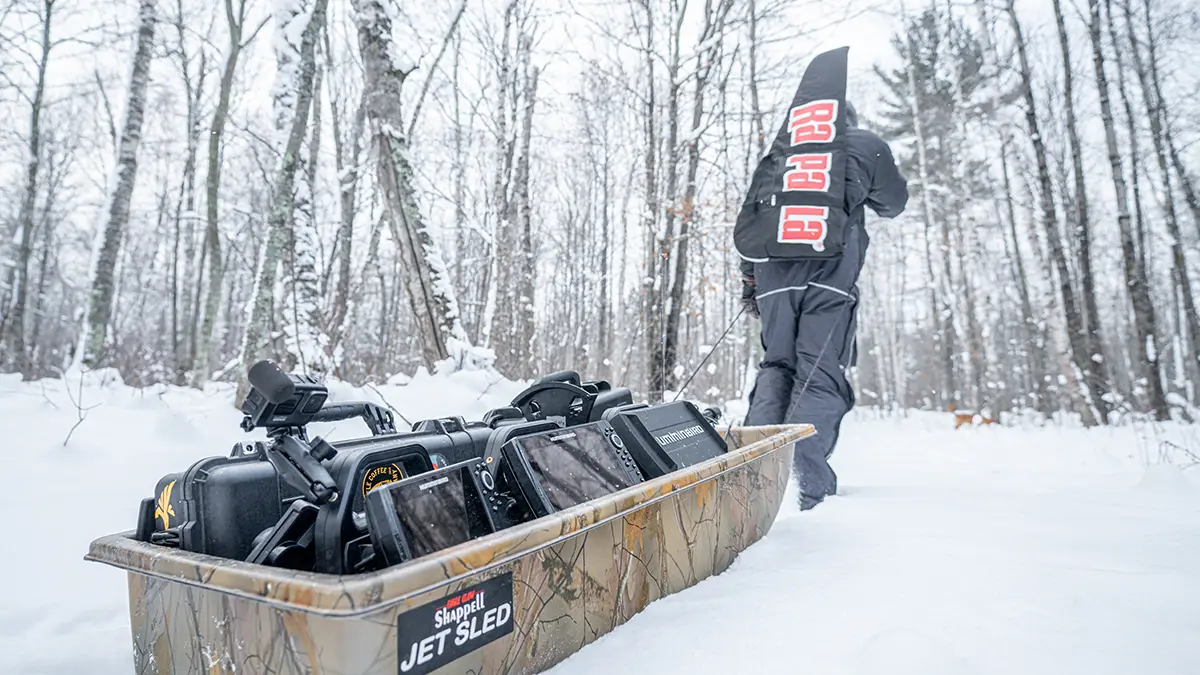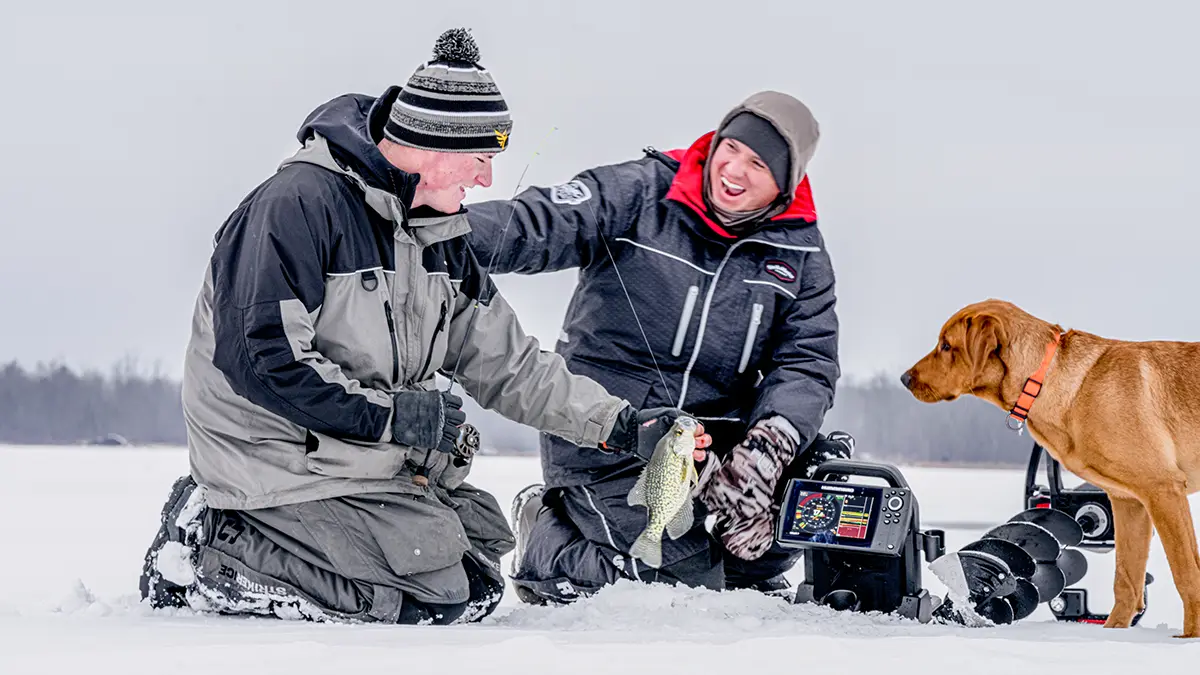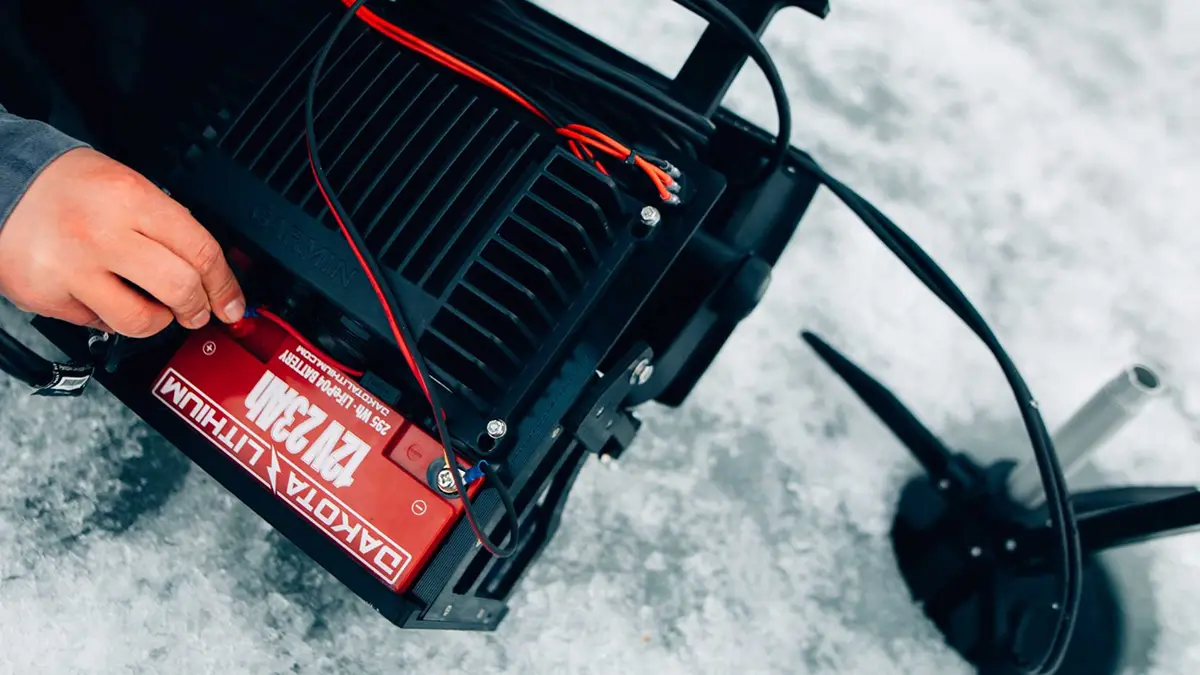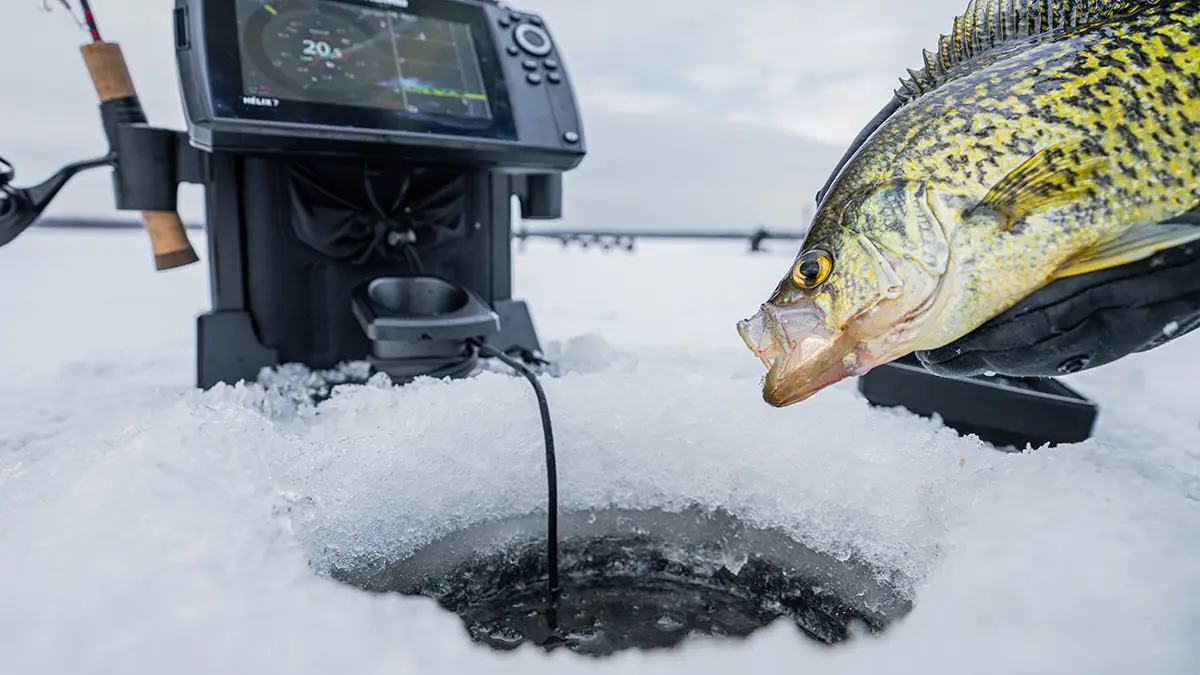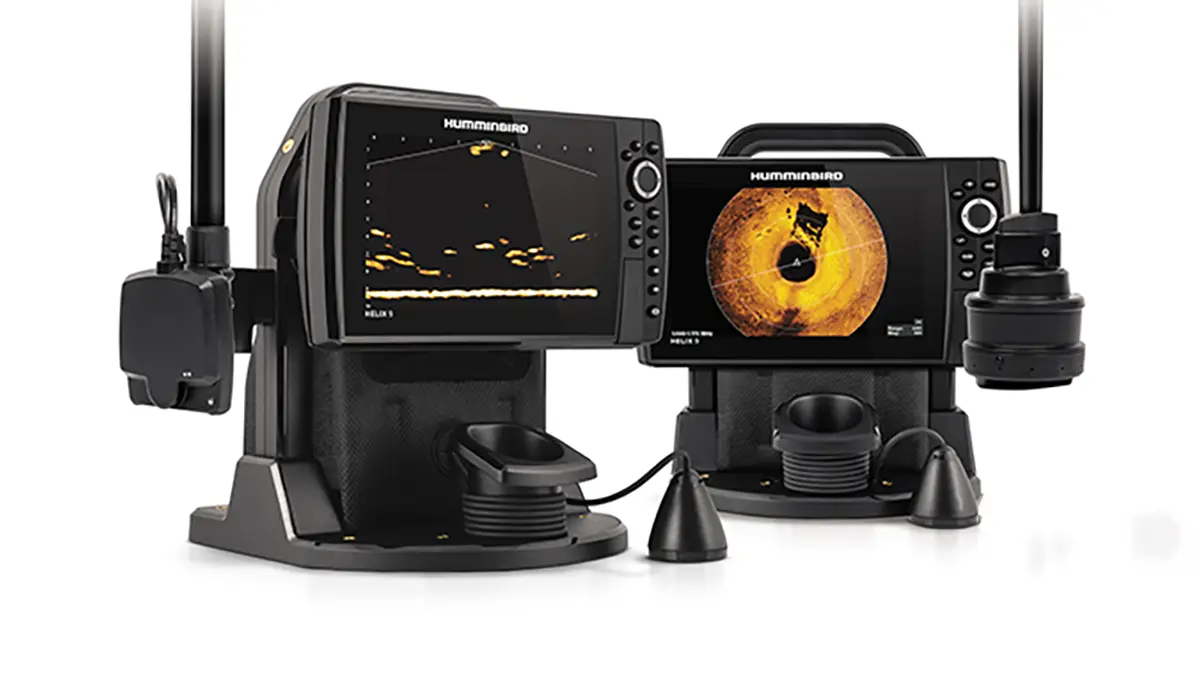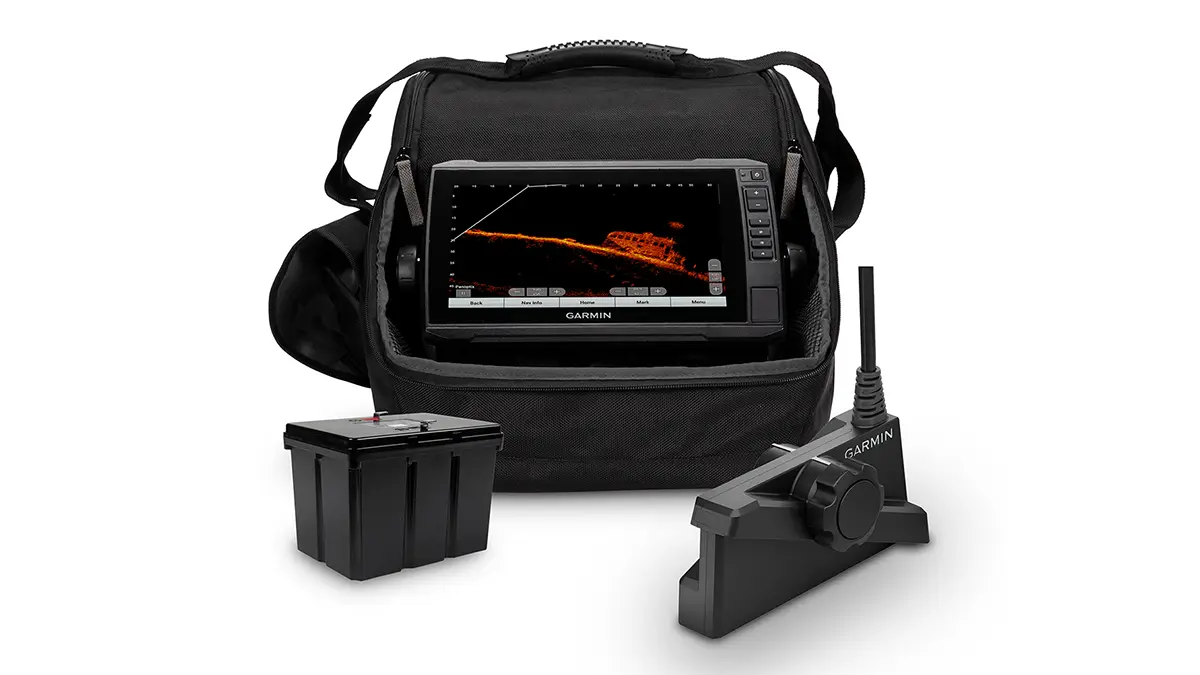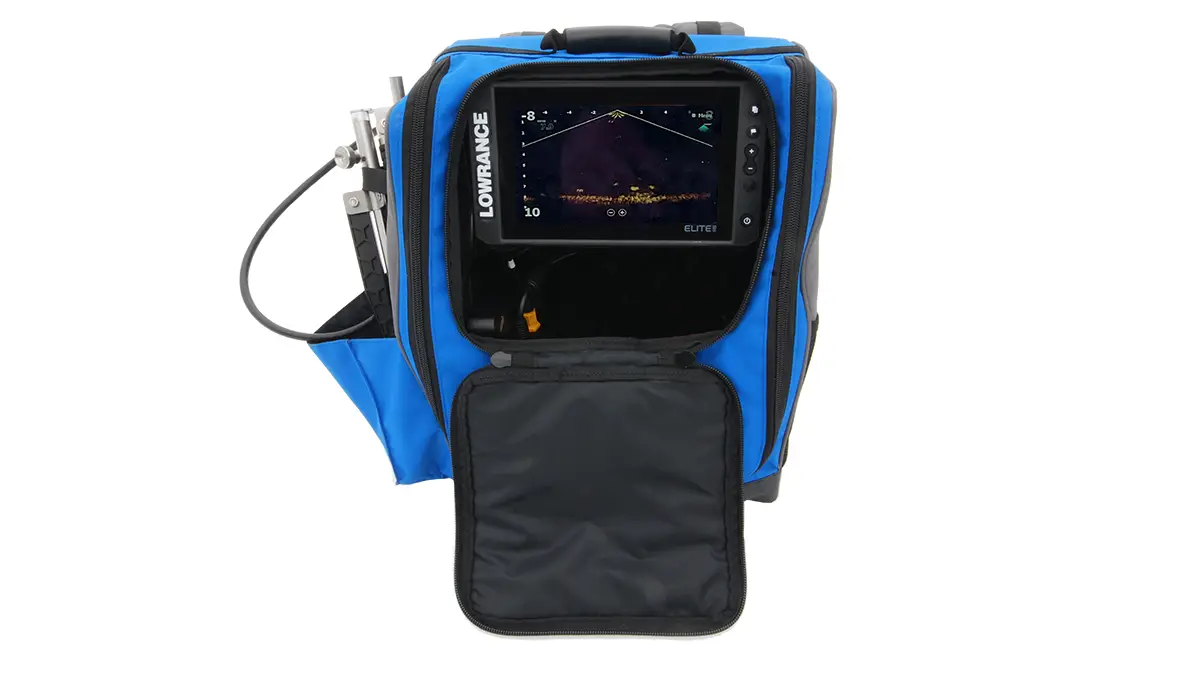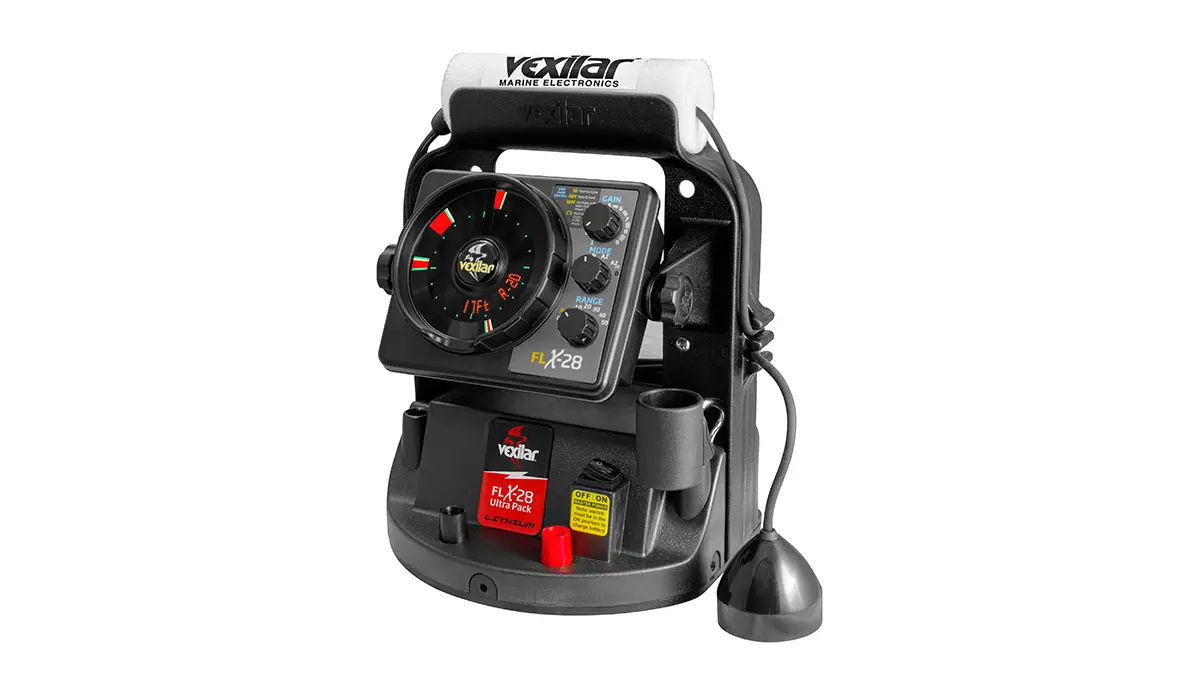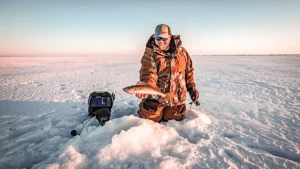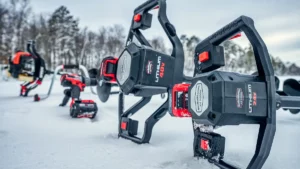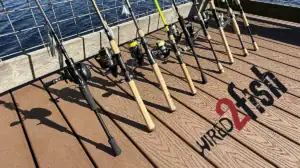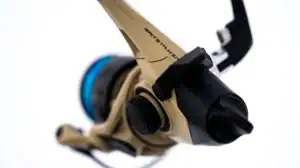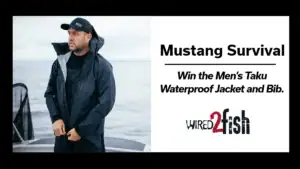A portable ice fishing fish finder is one of the most important pieces of equipment you can own for hard-water angling. This is because having an ice fishing sonar unit will make you a more efficient ice angler, helping you find fish faster and catch more of them.
When lakes are covered in ice, the fish are grouped up usually in very small areas and it’s more difficult and takes longer to rule out unproductive water without mapping and fish finders for locating the schools and active fish.
Today, the amount of sonar products available today provides anglers plenty of options to find the best ice fishing fish finder for their needs and budget. But, it can also be slightly intimidating to sift through what’s available, especially for those new to ice fishing. This resource will provide updated information you can use when deciding what ice fishing fish finder is best for you. It covers the following:
- Why you need an ice fishing fish finder
- What to consider when buying an ice fishing fish finder
- Best ice fishing fish finders from the top brands
Why You Need An Ice Fishing Fish finder
You will catch more fish with a portable, ice fishing fish finder than without one. Guaranteed. This is because a fish finder provides important information about what’s beneath the ice, which you can then use to decide where and how you fish. A fish finder gathers this data by sending and receiving sonar signals via its transducer.
Below are just a few examples of what it can reveal about what’s below and around an ice fishing hole. Keep in mind these benefits apply to any entry-level ice fishing fish finder offering traditional, 2D sonar. The list of impressive features grows further when more advanced technologies enter the equation, such as GPS functionality and forward-facing sonar.
Depth
A fish finder displays bottom depth and, in so doing, helps you avoid unproductive areas by fishing too shallow or too deep. Knowing depth also helps fine-tune location and find more productive areas. For instance, the depth reading from a fish finder can be used to pinpoint the upper and lower pivot points of a drop-off where walleye or other fish may be holding.
Bottom details
A quality fish finder displays information about bottom composition, which can be important for finding fish during winter. Using a sonar to locate soft-to-hard bottom transitions can be a step in the right direction to tracking down walleye. Ditto when it comes to finding soft-bottom flats loaded with invertebrates, which represent important wintertime forage for crappie, yellow perch and bluegills.
You’ll also know if there’s vegetation around. This is handy for locating productive wintertime habitat for many fish species. Hole hopping around weed beds and studying the sonar is a common strategy, too, for setting up over productive edges where fish lurk.
See fish and your lure
One of the best things a fish finder does is provide a real-time display of fish and their depth when positioned within the transducer’s sonar cone. Likewise for your fishing lure’s position within the water column.
Armed with this intel, an angler can easily get their lure into a fish’s strike zone, watch the fish’s reaction and customize the presentation to, hopefully, trigger a strike. This is often referred to as “video-game fishing.”
Equally significant, a fish finder will show when there are not fish around. With sonar you’re able to eliminate unproductive water more efficiently and track down fish faster.
Clues about fish activity levels
The more time you spend using an ice fishing fish finder, the better you’ll become at interpreting and getting extra info from the unit. It won’t take long for you to learn a sudden bump on the lake bed isn’t a technology glitch, but instead the arrival of a bottom-hugging fish. You’ll also learn how different species move when actively feeding versus when they’re in a neutral or inactive mood.
What To Consider When Buying An Ice Fishing Fish finder
You’ll need to weigh several different factors when deciding what is the best ice fishing fish finder for you.
Considerations include the following:
- Fishing style
- Price
- New fish finder kit or make your own
- Mechanical flasher or digital fish finder
- Who’s in your fishing community
- Navigation capability
- Transducer details
- Portability
- Lithium or SLA battery
Fishing style
A good place to start your search for your best ice fishing chartplotter is thinking about how you ice fish, and what sonar features are likely to be the most important to you.
Questions to consider include:
- Is traditional, 2D sonar enough for your needs, or do you want the latest and greatest features (e.g., forward-facing sonar, 360 imaging) in order to find prime structure and fish faster?
- Do you explore different waterbodies and target different fish species over the course of the season, and would these adventures be made easier with a fish finder offering GPS capability as well as forward-facing or 360 sonar technology?
- How hard are you on your gear and do you need a rugged unit that can stand the abuse of getting into remote, back lake locations?
- Do you move around a lot on the ice and, if so, will a fish finder’s weight and portability be key factors guiding your purchase?
- Do you already have a quality sonar head unit mounted in your powered boat or fishing kayak you’d like to convert for use on the ice?
- Are you already competent using a particular brand of fish finder in open-water and is staying “brand loyal” important to you?
Price
Determining how much money you have to buy a new ice fishing sonar narrows down the search of finding the best fish finder for you. We list specific product pricing further down in the comparison chart, but here are some general prices for context.
- Entry-level ice fishing fish finder kit screens: $329 and up.
- Mid-range ice fishing fish finders, many of which have internal GPS: $650 and up.
- High-end ice fishing fish finders with 9-inch screens and forward-facing or 360 technology: $2,599 and up.
New fish finder kit or make your own
Buying an ice fishing fish finder bundle is preferred by many anglers. These grab-and-go kits include everything you need get out on the ice and start fishing. Bundles span entry-level to high-end units, making it easy to get exactly what you want. These type of products will be the main focus of this article.
This said, if you own a sonar display on your boat or fishing kayak, you can likely get set up for ice fishing by combining this sonar unit with an ice fishing conversion kit, which are available from all major sonar brands. Going this route saves some money.
“I know several people that simply take their 360 off their boat and convert it to ice in the hard water season,” said Wired2Fish’s Kobie Koenig. “For this, I think it’s a great tool to be able to utilize year-round, especially on a budget.”
There’s also plenty of DIY inspiration online if you’re looking for a cheap ice fishing fish finder option, have the time and don’t mind hunting down individual parts to go the homemade route.
Mechanical flasher or digital fish finder
Another big step is deciding whether a mechanical flasher or a digital fish finder is the best option for you. There’s a lot to think about here, but before getting into the details a caveat is in order.
Comparing these two sonar categories is not an apples-to-apples scenario. Neither is putting an entry-level digital 2D sonar up against a high-end digital unit with forward facing sonar. We’re really talking an apples-to-oranges-to-bananas-to-[insert your fruit of choice here] scenario, folks.
With that out of the way, the following sections share things to consider when deciding between a mechanical flasher and a digital fish finder. To give some context up front, though, here’s a quick reference chart listing where certain brands’ products fall within these two categories.
Mechanical flashers
If all you need is traditional 2D sonar, a mechanical flasher may be the best ice fishing fish finder option for you. These units offer many benefits.
Detailed target separation is a big draw for many anglers. For example, when playing cat-and-mouse with panfish, walleye and whitefish, the 1/4-inch target separation of a Vexilar FLX-28 is a huge advantage for being able to accurately position an ice jig within a fish’s strike zone and trigger bites. If this detail matters to you, do your research because target id can vary from 1/4- to 2-1/2-inches, depending on the model.
Many anglers choose mechanical flashers because these electronics are very responsive. These fish finders set the standard for “real-time” capability, and maintain their excellent performance in extreme cold.
A proven track record, excellent reliability and ruggedness are a few other mechanic flasher strengths. Noteworthy, too, is all Humminbird, MarCum and Vexilar flashers come in compact, highly portable bundles. These packages become even more lightweight when powered with a lithium battery instead of a sealed lead acid (SLA) one.
Be aware that a flasher has a dial-style display. This can take a little time to get used to, but it’s far from a limitation; my kids got the hang of it rather quickly.
What mechanical flashers do, they do very well. What some anglers perceive as downsides often relates to when a mechanical flasher is compared to a digital fish finder. Things like internal GPS, preloaded lake contour maps and forward-facing sonar are simply features not available in a mechanical flasher.
Digital fish finders
The digital ice fishing fish finder category presents anglers with many options. These digital sonars span entry-level units to bundles offering the same cutting-edge sonar technology anglers are using in their boats.
Given the wide range of technologies offered with digital fish finders is a big selling point, below is a quick overview of the more popular features with ice anglers. And, as Wired2Fish’s Ryan DeChaine, notes going digital gives you the ability to download periodic software updates for improved performance.
2D Sonar
With a digital fish finder, you get access to different screen views with a traditional, 2D sonar. A a flasher view keeps things conventional. A scrolling display is popular because it keeps a record of interactions between a fish and your presentation. Or choose a split screen of both of these views.
How long you can access a scrolling display’s history varies between units. Being able to quickly study this information is useful and can speed up the process of learning what works to trigger fish to strike, a feature you won’t get with a mechanical flasher.
Forward-facing sonar
The term “game changer” gets thrown around a fair bit in fishing product descriptions, but I tend to agree with the term’s use for describing this cutting-edge tech with respect to ice fishing based on my experience with a Garmin LiveScope Ice Fishing Bundle for the past several years as well as Humminbird’s MEGA LIVE and Lowrance’s ActiveTarget Live Sonar.
“Forward-facing sonar is how all of those on the cutting edge of tactics fish, with regards to finding fish fast, sizing fish, determining what species, determining the size of the school, and of course video-gaming them,” DeChaine said.
If you’re not familiar with how this technology works on ice, the transducer mounts to the bottom of a pole that sits in an ice hole. Spinning the pole while watching the fish finder display lets an angler scan the entire water column outwards. With a range set to 75 feet and angler can scan a diameter of 150 feet, for instance.
The amount of information, level of detail and the massive amount of water you can scan with a turn of the wrist is extremely advantageous. Along with showing fish location, forward-facing sonar displays bottom structure and the location of wood and weeds. This, in turn, can be used to quickly determine the best location to drill holes while significantly reducing the number of search holes you need to drill.
DeChaine illustrated this with Humminbird’s MEGA LIVE in a recent video on ice fishing crappies.
These units also provide a down-looking mode. This is a great view when jigging as it provides a larger coverage area than 2D sonar. Being able to watch fish swim towards your lure from the side provides all kinds of data you can use to customize tactics to trigger more bites. You can often get a sense of fish size and position your bait to target specific fish.
Wired2Fish’s Kyle Peterson does a good job comparing and contrasting when to use forward versus down views for ice fishing.
In short, he equates forward view as his “search and destroy” mode to scan water and track-down the location of fish. After pinpointing his quarry and getting over a school, he switches to down mode, explaining: “What the down view does is give you a very precise look at that school of fish and how they’re moving.”
360 sonar
The unique underwater radar-like technology of Humminbird’s MEGA 360 Imaging is in a class all on its own. Positioned beneath the ice on a pole, the MEGA 360 Transducer emits a rotating imaging beam, which provides a constantly updating view up to 125 feet in all directions around your hole with excellent detail and clarity. Like forward-facing sonar, MEGA 360 is helping push the envelope of the latest and most advance ice fishing strategies. “
“Whereas forward-facing sonar is akin to scanning a mountain or field with a spotting scope for game, 360 sonar is more like building a game plan off of an aerial terrain map. 360 helps you pattern and understand the ‘why’ of good fishing spots,” DeChaine said. “It paints a detailed terrain map showing bottom composition, transition zones, habitat types such as grass edges, rock, wood, and in some cases, fish. It’s very useful seeing what’s around you, and to understand why an area is productive by knowing what’s down there. [An angler] can take this info to pattern other ‘like’ spots on a lake. A big deal, too, when assessing where to put a fish house.”
DeChaine also notes an angler can cursor out and drop waypoints on 360, which then display on the GPS view. This helps get to and drill holes over the primo spots in your area.
Navigation capability
Bundling GPS functionality with digital sonar provides a lot of value for mobile ice anglers. As when fishing open-water, a fish finder/chartplotter combo with internal GPS as well as preloaded digital lake contour maps will improve the efficiency and precision you’re able to navigate to productive fishing spots. Whether the destination is a saved waypoint or a promising piece of structure identified through map study, GPS will get you there in short order.
Many units also allow you to make your own custom ice fishing contour map. This tech can help find hidden gems not show on existing maps on large water systems, and is extremely handy on unmapped lakes.
If you typically ice fish from a fixed position shelter, like a wheelhouse, GPS may not rank as high on your list of must-have features. Although, some form of on-ice navigation will be essential to making sure you set up on a prime location and aren’t fishing unproductive water.
Digital sonar trade-offs
Digital fish finders have certain characteristics some may consider potential drawbacks, depending on their fishing style and specific on-ice needs. For example, the bigger the screen and more technology features (i.e., internal GPS, forward-facing sonar), the more power these units require (see the Power source section for solutions).
The poles, cables and weight of forward-facing and 360 sonar are not as straightforward to carry as a more compact portable sonar, especially when walking in deep snow. Extra care must also be taken to store these units properly to avoid damage in a vehicle or ice sled during transport. For some anglers, these extra steps are worth it for the advantages they gain using the latest fish finder technology.
There are also some anglers who believe that when compared to a mechanical flasher, a digital fish finder’s real-time display is not as fast, especially in extremely cold conditions, nor does it provide the same target separation detail. On the flip side, other anglers don’t even notice the differences and, if they do, believe the trade-off is a small price to pay for the additional features gained by going digital.
Learning to fine-tune a digital, LCD fish finder display can yield much better results while on the ice.
Who’s your fishing community
Returning to things to consider when choosing an ice fishing fish finder, it’s worthwhile to think about who you ice fish with on a regular basis, what ice sonars they own and whether you can pool technology resources to maximize the efficiency of the group. For example, when my family and I go ice fishing, one Garmin LiveScope Ice Fishing Bundle is plenty and can be shared by two of us in many scenarios. When we need to spread out or more of us are fishing, we pull out the Garmin ECHOMAP UHD 73cv Ice Fishing Bundle and a mechanical flasher.
I’m not alone on this approach either. I know several different groups of hard-core anglers who leverage both forward-facing and MEGA 360 units to locate and stay with fish within an area, but then hole hop and video-game fish with digital fish finders or quality mechanical flashers, like a Vexilar FLX-28. Using forward facing and 360 together is a good way to chase crappies on ice.
Going this route is certainly not for everyone, but if you regularly fish with the same group of anglers, it’s something to think about. At the very least, it may help decide the timing of purchases if planning to invest in high-end products, like forward-facing sonar and MEGA 360, for the ice as well as open-water.
Transducer
You’ll want to pay attention to transducer specs when comparing different ice fishing fish finder options. Without getting too deep into the weeds on this topic, here are a few things to keep in mind.
When it comes to traditional 2D sonar, a wide beam transducer (e.g., 19-degree cone angle) covers a larger area than a narrow beam transducer (e.g., 9-degrees). A wide beam is good for shallow water out to about 30 feet. Narrow is better for deeper water can help reduce interference from other sonar units and improves target separation. There are also many ice fishing fish finders offering a dual beam sonar, which lets you choose between a wide or a narrow beam.
You’ll also notice a lot of fish finders offer CHIRP sonar. By producing a wide range of frequencies, CHIRP produces a more detailed and accurate return of bottom, structure and fish. Once you see why Chirp is the best for your ice fishing finder, you won’t go back.
Lastly, a universal truth is a transducer needs to be protected. Any impact is a recipe for trouble, and can reduce the transducer’s performance and lifespan. Pay attention to how different fish finder brands design products for transducer storage and protection, and think about what approach is best suited to match your fishing style.
Power source
When deciding on an ice fishing fish finder, it’s important to think about your power needs based on how long you fish and the particulars of the fish finder you’re considering. Ice fishing bundles will come with either a SLA or a lithium ion phosphate battery, which can also be purchased separately.
Lithium has many advantages over a SLA battery, though you pay for it up front. A lithium battery is more expensive but, depending on the brand, you can expect its lifespan to be four or five times longer before it needs replacement. Lithium batteries typically deliver twice the runtime at full power (i.e., no fading screens), while being roughly half the weight of an SLA with comparable specs.
For perspective, you can expect to get a full day of fishing from a mechanical flasher and a 12-volt, 9-amp-hour SLA battery. If planning to fish long days with a digital fish finder, especially with a 7-inch screen or larger, consider going lithium if you fish long days. Carrying a spare SLA is another option, but this adds weight. In either case, turning down a digital screen’s brightness is one way to reduce power draw and extend runtime.
I’ve had good results with Dakota Lithium and Amped Outdoors in various fish finder set ups over the years. This season I’m trying a Dakota Lithium 12-volt, 23-amp-hour battery for my ice fishing Panoptix LiveScope System. Lynac, Norsk, MarCum and Vexilar are a few other lithium battery brands.
The above doesn’t capture everything you need to consider when choosing an ice fish finder, but we believe it covers many of the critical factors. With the above details in mind, as well as your own unique criteria, we hope the remaining sections of this guide help you make an informed purchase and choose the best ice fishing fish finder for your needs.
Best Ice Fishing Fish Finders by Brand
What follows is a breakdown of some of the best ice fishing fish finders available from several different brands. This list provide a snapshot of several of the most popular portable ice fishing sonar options and is assembled based on our own experiences with different products, input from other ice fishing experts and manufacturer feedback. In addition to showcasing a few products from each brand, manufacturer links are provided to make it easy for you to do your own research in order to choose the best ice fishing fish finder based on your individual requirements. A ice fishing fish finder comparison chart is provided at the end.
Humminbird Ice Fishing Fish Finders
Humminbird has a wide range of ice fishing fish finders, spanning cutting-edge digital units to mechanical flashers, as well as conversion kits for various Humminbird sonar products. Worth noting is ICE HELIX models with internal GPS include AutoChart Live capability as well as a Humminbird Basemap with depth contours for 10,000+ U.S. lakes. Upgrading to Humminbird’s LakeMaster charts means access to even greater high-definition details.
ICE HELIX 9 MSI+ GPS G4N MEGA Live Bundle
The ICE HELIX 9 MSI+ GPS G4N MEGA Live Bundle is a top-tier digital ice fishing fish finder. It offers the transformative technology of MEGA Live sonar in a hard-water ready kit with everything you need to track down fish and see how they respond to your lure in real-time. The kit includes a bright, 9-inch high-resolution HD display ICE HELIX MSI+ G4N with ICE Shuttle, MEGA LIVE Transducer with 3-section ICE shaft, dual spectrum CHIRP ICE Transducer, and a 20-amp-hour lithium-ion battery and charger.
Available at:
ICE HELIX 9 MSI+ GPS G4N MEGA 360 Bundle
The ICE HELIX 9 MSI+ GPS G4N MEGA 360 Bundle mirrors many of the features of the LIVE Bundle but puts the underwater radar-like technology of MEGA 360 in the hands of ice anglers. With 360’s rotating imaging beam, the 9-inch high-res HD display is constantly updating, showing you how fish are moving within an area. ICE Shuttle, MEGA 360 Transducer with ICE shaft and GPS Heading Sensor, dual spectrum CHIRP ICE Transducer, and a 20-amp-hour lithium-ion battery and charger also included.
Available at:
ICE HELIX 7 G4
The ICE HELIX 7 G4 is an excellent digital ice fishing fish finder for anglers wanting dual spectrum CHIRP 2D sonar, built-in GPS and mapping features. It comes bundled with the new HELIX ICE Shuttle, which features a 15-amp-hour lithium battery. Get all this plus everything you need to use the Helix on a boat or in a portable application with the All Season fish finder bundle.
Available at:
ICE 55 Portable Flasher
The ICE 55 is Humminbird’s top mechanical flasher and has a six-color, ultra-bright fiber optics flasher display. Dual beam transducer, automatic depth scale, adjustable zoom, target line depth marker and center LCD display are a few features of this bundle, which comes with a carrying case and 9-amp-hour battery with charger.
Available at:
More details at Humminbird.com.
Garmin Ice Fishing Fish Finders
Garmin offers ice anglers a range of ice fishing bundles, including some with their popular LiveScope forward-facing sonar, packaged in a rugged, glove-friendly portable carrying cases. If you already own a Garmin ECHOMAP or GPSMAP unit, ice kits and other necessary parts are available for assembling your own bundle.
LiveScope Plus Ice Fishing Bundle LI
The LiveScope Plus Ice Fishing Bundle LI is a top contender for the best ice fishing fish finder title, and recently won the ICAST 2022 Best of Show Ice Fishing Category. LiveScope Plus delivers the latest in live, real-time scanning sonar technology with improved resolution, reduced noise, clearer images and better target separation in Forward and Down modes.
The bundle includes a 9-inch ECHOMAP UHD 93sv touchscreen sonar-chartplotter GPS combo with keyed assist that’s preloaded with LakeVü g3 inland maps with integrated Garmin and Navionics data for more than 18,000 lakes and Quickdraw mapping software. Also included are a LVS34-IF transducer with cold-weather flexible cable, GLS 10 sonar black box, swivel pole mount, 16.5-amp-hour lithium battery and charger, and a portable carrying case with a bag.
Available at:
Garmin’s LiveScope Ice Fishing Bundle is another option for getting into the ice fishing forward-facing sonar game. It doesn’t offer the Plus features and comes with a SLA battery, but is another of the brand’s best-selling units for ice fishing.
ECHOMAP UHD 73cv Ice Fishing Bundle
The ECHOMAP UHD 73cv Ice Fishing Bundle is Garmin’s most popular mid-range ice fishing bundle. It features a bright, sunlight-readable 7-inch touchscreen display with keyed assist. Its GT10HN-IF ice fishing transducer offers CHIRP sonar for crisp, clear fish targets with excellent target separation, and features a selectable beam width from 8 to 16 degrees.
Selecting ice fishing sonar mode increases the frequency for better quality images on screen. The unit is preloaded with LakeVü g3 mapping for more than 18,000 lakes and offering Quickdraw Contour mapping capability.
Available at:
STRIKER Plus 4 Ice Fishing Bundle
The STRIKER Plus 4 Ice Fishing Bundle is an entry-level option delivering good value for the money. This easy-to-use 4-inch color fish finder has a dual-beam ice fishing transducer with CHIRP traditional sonar for clear images and enhanced target separation. Built-in, high-sensitivity GPS lets you mark and return to hot spots and lake access points, while Quickdraw Contours mapping allows you to build maps with 1-foot contours.
Available at:
More details at garmin.com.
Lowrance Ice Fishing Finders
Lowrance’s legacy in sonars dates back to 1957 with their invention of The Little Green Box. Today, the brand provides a collection of digital ice fishing fish finder kits from entry-level packages to a high-end bundle featuring forward-facing ActiveTarget Live Sonar. Portable Power Packs and other accessories are also available for assembling an ice fishing kit for owners of a Lowrance HDS LIVE, Elite FS, or HOOK Reveal display.
Elite FS 9 and ActiveTarget Explorer Series Pack
Lowrance describes the Elite FS 9 and ActiveTarget Explorer Series Pack as a complete portable live sonar and fish finder solution. Track fish movements using the Ice Transducer Pole and watch their real-time response to your lure in forward and down views on a 9-inch high resolution multi-touch display. It’s bundled with a premium Explorer bag and shuttle frame, ActiveTarget Live Sonar Transducer and a 24-amp-hour lithium battery with dual USB charging ports and a built-in voltage meter. Also features internal GPS and preloaded high-resolution C-MAP Contour+ charts.
Available at:
You can also buy the kit with no display included from Amazon.
The HOOK Reveal 5 SplitShot and All-Season Pack comes with everything you need to start catching fish on the ice. Key features include Autotuning Sonar, FishReveal, Lowrance CHIRP sonar and a crisp, clear 5-inch SolarMAX Display. GPS capability is bolstered with Contour+ US/CAN C-MAP Card, or map uncharted water in real time using Genesis Live. Also included is a skimmer transducer with suction cup mount, allowing for use from a boat in open water. Want a bigger screen? Check out the HOOK Reveal 7 SplitShot with All-Season Pack.
More details at lowrance.com.
MarCum Ice Flashers & Sonars
Since releasing their LX-1, LX-3, and LX-5 flashers in the early 2000’s, MarCum has continued to put forward crisp, precise and feature-laden sonar packages specific for ice fishing. With a variety of mechanical flashers and digital fish finders, along with Digital Series Lithium Shuttle Combos as well as underwater fishing cameras, hard-water enthusiasts have plenty of choices from this reputable brand.
LX-7L
The LX-7L Lithium Equipped Sonar System with its flat panel color 8-inch LCD screen is one of MarCum’s most popular digital ice fishing sonars. A “Multifaceted Sonar Display” lets anglers fully customize window views, choosing from water-column vertical, vertical zoom, flasher-dial and traditional horizontal LCD graph display options. The dashboard display can be customized to show depth, battery voltage, range, gain, interference rejection and target adjust.
Sonar Footprint technology displays scan area at any depth in either the 8- or 20-degree transducer cone angle, which aids in identifying fish targets relative to the transducer and your lure. Target separation down to 1/2-inch, selectable zoom window, USB port for firmware upgrades, padded soft pack and 10-amp-hour lithium battery with charger are other features. The LX-7L is also in a Lithium Shuttle Bundle, and for GPS capability see the MX-7GPS.
Available at:
M1 Flasher System
The M1 Flasher System is an excellent entry-level mechanical flasher. It features brushless, quiet operation and delivers a bright, crisp color definition of bottom, fish, baitfish and your lure on a high resolution display. The M1 has bottom zoom, a split screen zoom with bottom lock, 2-inch target separation, the brand’s patented interference rejection system and a wide 20-degree transducer cone angle. Comes with a padded soft pack and 7-amp-hour SLA battery. Want more features and a lithium battery? Take a look at the M3L and M5L Flasher Systems.
Available at:
More details at marcumtech.com.
Vexilar Marine Ice Flashers
Vexilar has a well earned reputation of making purpose-built ice fishing mechanical flashers and heavily influencing modern ice fishing as we know it today. Currently, the brand has six flasher models, which are available in several ice fishing bundles in three hard-case configurations with their patented Ice-Ducer transducers. Vexilar also offers softpacks and many accessories for customizing mechanical flasher kits. Here are just two options.
FLX-28
The FLX-28 is a high-end flasher and an extremely popular pick among serious ice anglers. It’s available in Pro Pack, Genz Pack and Ultra Pack Lithium bundles with a 9-degree Pro-View Ice-Ducer. The FLX-28 has a brushless data transfer design system for a sunlight-readable display and less noise.
Features include a flat screen, digital depth, less than 1/4-inch target separation, auto range, two zoom zones, five color palette choices, five foot depth range adjustments starting at 10 feet, maximum range of 300 feet, day/night display brightness settings, low power options for better target resolution in shallow water, and a weed mode for better performance when fishing in vegetation. If you want even more flasher features, see the FLX-30.
Available at:
FL-8SE Genz Pack
The FL-8SE Genz Pack is Vexilar’s entry-level unit and a very capable flasher, but for an extra $50 you can step up to the FLX-12 Genz Pack and get additional features. The FLX-12 has a flat screen, low power mode and 10 more steps of interference rejection, for a total of 20, to limit interference from other sonar systems.
Available at:
FLX-12
The FLX-12 comes with a 12-degree Ice-Ducer (the brand’s most popular transducer) and features Vexilar’s exclusive brushless data transfer technology with a bright, sharp display. Other highlights include five depth ranges to 120 feet, night mode option for better low light visibility and a low battery warning feature.
Available at:
More details at vexilar.com.
